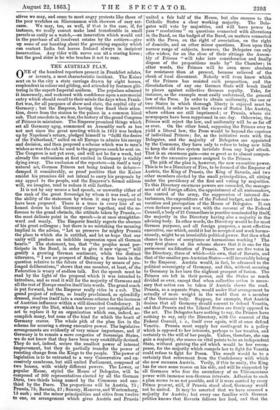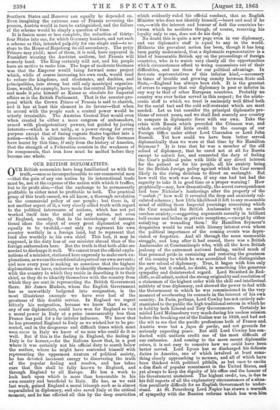THE AUSTRIAN PLAN.
ONE of the hundred reporters present in Frankfort relates, or invents, a most characteristic incident. The Kaiser sent on to the city a state carriage drawn by eight horses, resplendent in colour and gilding, and attended by footmen glit- tering in the superb Imperial uniform. The populace admired it immensely, and reckoned with confidence upon a ceremonial entry which should recall to their minds the days when Frank- fort was, for all purposes of show and state, the capital city of Germany ; but the Emperor, having thus fixed their atten- tion, drove from the station to the palace in a common hired cab. That anecdote is, we fear, the history of the grand Congress of Princes in miniature. The Emperor promised things which set all Germany agog, summoned an Assembly such as has not met since the great meeting which in 1815 was broken up by Napoleon's return, pledged himself to "fulfil the desire of the Fatherland," called on all Europe to admire his energy and decision, and then proposed a scheme which was to men's wishes as was the cab he used to the gorgeous coach he sent on. The Congress is not yet over, and will not be for a week, but already the enthusiasm at first excited in Germany is visibly dying away. The exclusion of the reporters—in itself a very natural act, German Princes not being trained to debate— damped it considerably, as proof positive that the Kaiser amidst his promises did not intend to carry his proposals by any appeal to the people, and the Emperor's formal address will, we imagine, tend to reduce it still further.
It is not by any means a bad speech, or unworthy either of the rank of the great Sovereign by whom it was read, or of the ability of the statesmen by whom it may be supposed to have been prepared. There is a trace in every line of an honest desire to bind Germany closer together, and the re- ference to the grand obstacle, the attitude taken by Prussia,— the most delicate point in the speech—is at once straightfor- ward and manly. The Emperor frankly regrets the absence of his great colleague ; but there is no mistaking the meaning implied in the advice, "Let us preserve for mighty Prussia the place to which she is entitled, and let us hope that our unity will produce an indelible impression upon all German hearts." The statement, too, that "the peoples must par- ticipate in the Bund, in order to give it new vigour," will gratify a growing German sentiment, while the distinct utterance, "I see no prospect of finding a firm basis in the question relative to the future of Germany by means of pro- longed deliberations," shows that one member, at least, of the Federation is weary of endless talk. But the speech must be read by the light of the proposal which it was intended to introduce, and so read it will for the majority of Germans and all the rest of Europe resolve itself into words. The grand coach is put forward, but the Emperor really rides in a cab. The grand project of reform, so loudly proclaimed, so splendidly dressed, resolves itself into a cumbrous scheme for the increase of Austrian influence within a still disunited Confederacy. It sweeps away the Diet, which has never yet accomplished an act to replace it by an organization which can, indeed, ac- complish many, but none of the kind for which the heart of Germany craves. The whole pith of the plan lies in the scheme for securing a strong executive power. The legislative arrangements are evidently of very minor importance, and if Germany is to remain a mere congeries of Sovereign States, we do not know that they have been very unskilfully devised. They do not, indeed, secure the smallest power of internal improvement, but they do partially transfer the power of resisting change from the Kings to the people. The power of legislation is to be entrusted to a very Conservative and ex- cessively cumbrous, but still united Parliament, composed of two houses, with widely different powers. The Lower, or popular House, styled the House of Delegates, will be composed of 300 representatives elected by all the German Diets, two-thirds being named by the Commons and one- third by the Peers. The proportions will be Austria, 75; Prussia, 75; Bavaria, 27; Saxony, Hanover, and Wnrtemburg, 15 each ; and the minor principalities and cities from twelve to one, an arrangement which gives Austria and Prussia
united a fair half of the House, but also ensures to the Catholic States a clear working majority. The Dele- gates will vote by majorities, and will have power to pass " resolutions " on questions connected with alterations in the Bund, on the budget of the Bund, on matters connected with the Press, on the right of association, on the right of domicile, and on other minor questions. Even upon this narrow range of subjects, however, the Delegates can only offer wishes, for on the close of their sittings the Assem- bly of Princes "will take into consideration and finally dispose of the propositions made by" the Chamber; in other words, the Princes will be even more absolute for resistance than at present, because relieved of the check of local discontent. Nobody will bven know which of the Princes has resisted each proposition, and the dissatisfaction of any one German State will break itself to pieces against collective German royalty. Take, for instance, as the example most easily understood, the general law of the Press. In order to obtain uniformity, the one or two States in which thorough liberty is enjoyed must be restricted, in order to meet the views of States like Austria, where editors are still imprisoned ; or Prussia, where six newspapers have been suppressed in one day. Otherwise, the Princes will reject the law, and uniformity will be as far off as ever. On the other hand, supposing the Princes ever to yield a liberal law, the Press would be beyond the caprices of individual Princes ; for, as the initiative rests with the Delegates, and the majority of Delegates are appointed by the Commons, they have only to refuse to bring new bills to keep the old free system inviolate from any legal attack. That is an enormous gain—one so great as to almost compen- sate for the excessive power assigned to the Princes.
The pith of the plan is, however, the new executive power. This is to be a Directory of Five, to be formed of the Emperor of Austria, the King of Prussia, the King of Bavaria, and two other members elected by the small principalities, all sitting under the presidency of the first and voting by majorities. To this Directory enormous powers are conceded, the manage- ment of all foreign affairs, the appointment of all ambassadors, the control of the army, the suppression of internal dis- turbances, the expenditure of the Federal budget, and the con- vocation and prorogation of the House of Delegates. It can even declare peace and war, with the consent of the Federal Council, a body of 21 Counsellors in practice nominated by itself, the majority in the Directory having also a majority in the advising body. In other words, the Directory would be for most German purposes, and all foreign purposes, a most effective executive, one which, could it but be accepted and work harmo- niously, might be an irresistible political power. But then what chance is there of acceptance or harmonious working ? The very first glance at the scheme shows that it is one for the permanent nullification of Prussia. There are five votes in the Directory, three of which—his own, that of Bavaria, and that of the smaller pro-Austrian States—will invariably belong to the Emperor. Austria would, in fact, be advanced to the political sovereignty of Germany, and this, without securing to Germany in her turn the slightest prospect of fusion. The Princes are left in their power, and the States as much divided as ever, except that when collective action is neces- sary that action can be taken if Austria shows the road. Prussia, as a separate State, would under that arrangement be actually of more weight in the world than as a member of the Germanic body. Suppose, for example, that Austria desires that all Germany should consent to defend Venetia, and that Prussia and the Liberal States are firmly opposed to the act. The Delegates have nothing to say, the Princes have nothing to say, only the Directory, with the consent of the Federal Council, 1. e., itself over again, will at once defend Venetia. Prussia must supply her contingent to a policy which is opposed to her interests, perhaps to her treaties, and certainly to the will of her people. Unless, therefore, she can gain a majority, she ceases on vital points to be an independent State, without gaining the aid which would be her recom- pense, for the majority which compels her to fight for Venetia could refuse to fight for Posen. The result would be to a certainty that retirement from the Confederacy with which she now menaces Austria. Verily, if this be unity, the King has for once some reason on his side, and will be supported by all Germans who fear the ascendancy of an Ultramontane power with immense non-German interests. Adhesion to such a plan seems to us not possible, and if it were carried by every Prince present, still, if Prussia stood aloof, Germany would not be united. It may be asserted that we have assumed a majority for Austria; but every one familiar with German politics knows that Bavaria follows her lead, and that the Southern States and Hanover can equally be depended on. Even imagining the extreme case of Prussia reversing the process, Austria would in tarn be extinguished, and the failure of the scheme would be simply a question of time. It is fusion more or less complete, the reduction of thirty- four States into one, for which Germany hankers, and not such a scheme as this, intended palpably for one single end—to re- store to the House of Hapsburg its old ascendancy. The petty Princes may yield; most of them, it is said, have appeared in Frankfort wearing the Austrian uniform, but Prussia will scarcely bend. The King certainly will not, and his people have no motive to make him. The hope of moderate Germans was that the Emperor would bring forward some project which, while of coarse increasing his own rank, would tend to reduce the kingdoms, and electorates, and duchies, and principalities, into strong but still only municipal organiza- tions, would, for example, have made the central Diet popular, and made it plus himself as Kaiser as absolute for Imperial affairs as is the British Parliament. That is the counter-pro- posal which the Crown Prince of Prussia is said to cherish, and it has at least this element in its favour—that when in accord with the people such a central power would be utterly irresistible. The Austrian Central Diet would even when created be either a mere congress of ambassadors, armed with plenipotentiary powers, but guided by jarring interests—which is not unity, or a power strong for every purpose except that of fusing cognate States together into a nation—which is ultimate disunion. Surely the Germans have learnt by this time, if only from the history of America, that the strength of a Federation consists in the weakness of its components, that iron bars must be melted before they become one whole.































 Previous page
Previous page